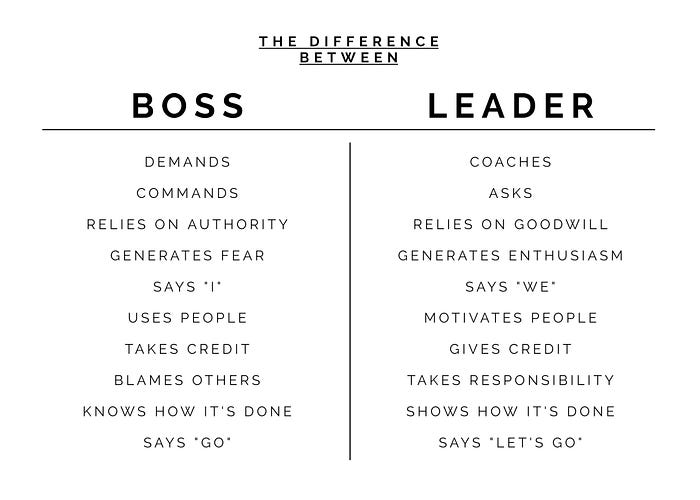If you want to become successful at some point, and you want to have more time and freedom — you’ll have to outsource some work.
Below are a few tips you can use to be a good leader.

1. Be a leader, not a boss
It was always my dream to coach, help and lead people. To reach this goal, I have taken a few management courses and I also became a personal health coach in my free time. Right now I’m leading a team of video content creators, spread around the world, and I’m successfully managing IT Security projects in various companies.
In the beginning it was hard to manage the work and keep everyone motivated and focused. I was giving them assignments, telling them what to do and tracking every bit of their work. While this worked in my project management job, it didn’t work with leading my team.
I was being a boss, not a leader.
I have worked as a consultant in many companies, for many bosses, leaders and managers. Some were good, some were terrible, others were al right. So, what did the good ones — the leaders — do?
2. Let them come up with the solution
Give people problems to solve instead of tasks to do. People love feeling “wanted” or “needed”.
If ask them: “We have problem x, who has any ideas on how to solve it?”.
People will come with suggestions on how to achieve that goal. Now it’s their idea, it’s their goal to work towards. Because of this, they will be way more motivated to reach that goal. Also, don’t forget to give them credit for their ideas.
3. Don’t boss around, but ask
If you would say “we are going to do it like this and that”, then they will mostly just do the tasks without much passion, or not ask any questions because they think the boss decided it already anyway.
Asking questions is the best way to get people engaged in something. And not only that, but mostly the people that develop or create something a product, know their product best.
So, present them with a problem and ask:
- How would you solve this?
- Do you have any other ideas?
- What do you suggest?
4. Trust your employees
Once you have set your goals to solve a problem, then trust them to do it. Don’t try to control them, but delegate and have faith that they will get there.
Mistakes may be made, but this is what showing trust is about. Not everything can be perfect right away. You can create guidelines, but allowing to strive a little bit outside these lines and give freedom to experiment, will make your employees happier and feel more trusted. As a result they will perform better.
If you see someone struggle, coach them, don’t command them. Ask them what’s wrong and ask how you can help. Is the task too complicated? Do we need extra people with a specific skillset?
5. Have weekly follow-up meetings and be transparent
Last but not least: have weekly (or more) follow-up meetings. Communicate the status of the project regularly, let people know the progress.
If you’re giving trust and freedom to your employees, it’s important that everyone stays up to date about the mission, understands the goals and knows what challenges lay ahead.
During these follow-ups, communicate open and clearly, let everyone be heard and your colleagues feel confident they are doing well, well on their way to reach the goals.
—
Keep learning!
Being a great leader, and especially learning HOW to be a great leader takes time. Mix work with pleasure, dedication with freedom, pressure with fun, but most of all: never stop learning. The world isn’t standing still and neither should you.
Thank you for reading — and if you’re interested in similar entrepreneurial / motivational posts, I kindly invite you to follow me. Thanks! — Michiel









